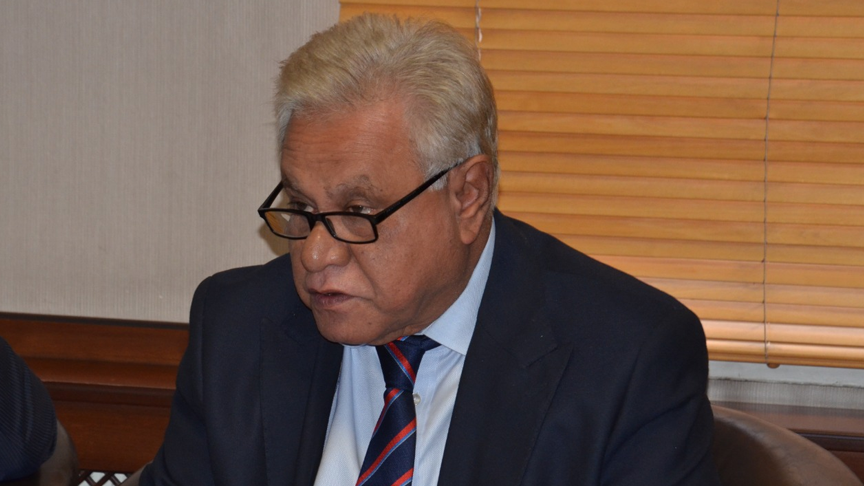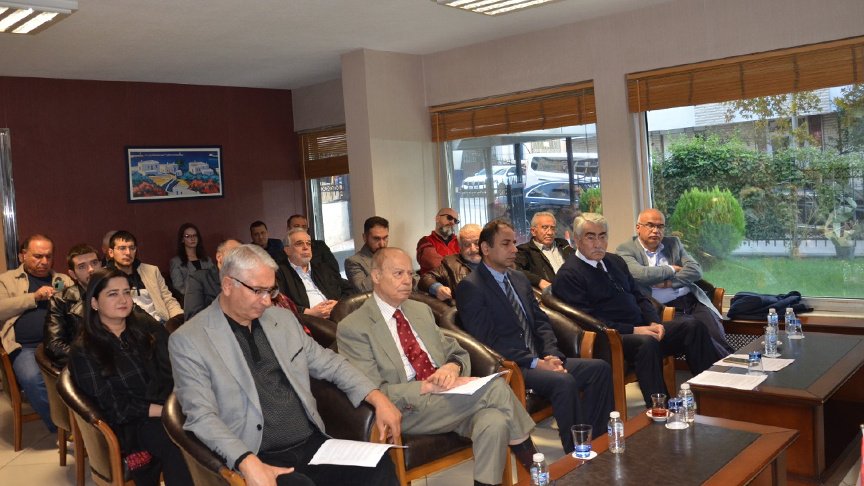
On Saturday, October 19, a meeting titled “Kashmir Black Day” was held at the Institute of Strategic Thinking (SDE). The session was chaired by SDE Vice President Alper Tan, and the keynote speaker was Yousaf Junaid, the Ambassador of Pakistan in Ankara.
SDE Vice President Alper Tan, in his speech, used the following statements:
"On October 27, 1947, an important turning point occurred in the dispute between India and Pakistan over the Kashmir region. India sent troops to the region upon the request of Hari Singh, the Maharaja of the princely state of Kashmir. This initiated the annexation of Kashmir to India and a crisis, tension and conflict between India and Pakistan that continued to this day. Since that day, Kashmir issue has continued as an unresolved issue between India and Pakistan.
India and the international community are pursuing a policy that disregards international law on this issue. The current situation will be explained by the honorable ambassador shortly.
Some countries in South and South East Asia, even if they are economically strong, cannot make decisions parallel to their economies. The security paradox always comes to the fore. In other words, countries are forced to think about the security and interests of the superpowers without thinking about themselves.
Pakistan and India have been in open hostility over Kashmir since the day they were founded. Kashmir is important for India and Pakistan both ideologically and strategically.
From New Delhi’s perspective, Kashmir symbolizes India’s integrity. From an Indian perspective, if India fully controls Kashmir, it will open a door to Central Asia.
But India has not been able to fully annex this region for 77 years. In trying to do this, he used force and systematically killed around 500,000 people, raped women, tortured people in prisons, blinded 6,000 people. He destroyed buildings, gardens, vineyards and orchards and insulted and humiliated the Kashmiris.
They call the unarmed Kashmiri people terrorists. They give false and incorrect information about them. India has deployed around 1,000,000 soldiers to control the unarmed Kashmiri people in the region. According to India’s own statistics, the number of local “militants” is only 250. For this, they are sending one million soldiers. This number is more than half of the Indian army. Is this many soldiers only to combat 250 militants or to occupy the region under the pretext of “terrorism”?
India claims that Pakistan is supporting “terrorists” in Kashmir. However, India is oppressing innocent people like Zionist Israel. The Narendra Modi government is one of the closest supporters of the genocidal Israeli government.
The international institutions that we frequently call upon to resolve Kashmir and similar crises have never wanted a solution. On the contrary, they and the dominant powers that structure the global order are the states that created and escalated the problem. They benefit from the lack of a solution.
Another reason why the international community ignores this issue is the current cruel world order. India had relations with the Soviet Union during the Cold War, it was not an enemy of the US, but it did not have friendly relations either. However, after the collapse of the Soviets, after 1995, India began to turn to Washington. In the following years, a closeness developed between India and the US, and India directly and indirectly asked for help from the US on the issue of Jammu and Kashmir and tried to separate Jammu and Kashmir from Pakistan through Washington.
In short, we can say that Washington and India acted together strategically. Because US interests were at risk. India convinced Washington by stating that it would protect US interests against China in the region. We do not think that India will fight against China for the US. On the contrary, India is trying to strengthen its ties with China. In this regard, it is not being honest and is acting differently in Beijing and Washington, and is keeping a foot in both sides of the world.
In economic terms, India is doing more business with the West under the leadership of the US, and these countries have increasing interests in the region. In recent years, the US has been losing interest in the Middle East and focusing on the Asia-Pacific region.
The number of Western powers in the UN General Assembly is fewer. However, in terms of the decisions made, especially in forums such as the UN Security Council and the Human Rights Council, America has its way. That is why the Kashmir issue has always been put aside. However, unless this issue is resolved, it will continue to pose a danger to the entire world.
If this dispute is not resolved, the fragility in South Asia will continue. In 1998, India and Pakistan became nuclear powers. The nuclear dimension makes the issue an international issue.
If there happens a nuclear war between India and Pakistan, refugees will go to every part of the world. 2.5 billion people may be exposed to radiation and dangerous consequences directly or indirectly. All criteria in the declaration of human rights are being violated by India. They are doing this recklessly and are not afraid of any punishment. However, this banditry does not concern the international dominant powers. Such biased or indifferent attitudes of the dominant powers in the world are not only specific to Kashmir. It is the same for the crises in the Caucasus, for the Balkans, for the Rohingya Muslims, for Africa, the Middle East, Cyprus and finally for the Palestinian Muslims who have been subjected to the genocide of Zionist Israel, which has been watched live on TV from all over the world since October 7, 2023. The sponsors of the genocide in Palestine are the founders of international institutions. If we want to solve the Kashmir issue, we should stop inviting international institutions to take action. We should have self-confidence. We should believe that we can solve the problems on our own or with the solidarity of countries that are true friends, and we should focus on this issue. We have great potential. However, we are in a state of lack of self-confidence. We must combine our strengths and possibilities. If we can do this, we will solve the issue despite them without any need for international institutions and. Just as we solved it in Libya! Just as we solved it in Karabakh! Just as we solved it in Cyprus!"
Ambassador Yousaf Junaid, in his speech, expressed the following statements:
"Kashmiris in the Occupied Jammu & Kashmir as well as across the globe will observe “Black Day” in few days on 27 October to mark 1947 when India landed its troops in Srinagar and forcibly and illegally occupied the State of Jammu & Kashmir.
Jammu & Kashmir is an internationally recognized disputed territory, and remains one of the longest lasting situations of foreign occupation along with Palestine. It is one of the oldest unresolved issues on the agenda of the UN Security Council.
The Occupied Jammu & Kashmir also has the dubious distinction of being the most heavily militarized zones in the world, with over 900,000 Indian occupation forces deployed there. This dispute has been the cause of numerous conflicts in the region, and continues to jeopardize the prospects for regional peace, stability and prosperity.
The UN Security Council, through its numerous resolutions, declared that the final disposition of the State of Jammu & Kashmir would be made in accordance with the will of the people expressed through free and impartial UN supervised plebiscite.
However, we all know that despite repeated attempts, no meaningful progress has been made by India towards the implementation of these resolutions.
The dispute is also poignant reminder of the unfinished business of partition, and the denial of the aspirations of the Kashmiri people, leaving the disputed region with an open wounds of Kashmiris bleeding till to date.
I would like to underscore that India’s first Prime Minister Jawaharlal Nehru is on record stating that ‘We have given our word, and we cannot go back on it and we will give the Kashmiris their right. Despite the solemn commitments made by the Government of India to the UN Security Council, to Pakistan, and to the people of Jammu & Kashmir, to abide by and implement relevant Security Council resolutions, India has progressively reneged on these commitments over the years. India has exploited this collective failure by resorting to state-terrorism to suppress the legitimate aspirations of the Kashmiri people.
In past three decades more than 96,000 Kashmiris have been martyred by Indian occupation forces, many under custody. Although the occupied territory has seen violent oppression for over seven and half decades, 5 August 2019, opened another bleak chapter in Kashmir’s tortured history. Indian actions of 5th August 2019 were aimed at changing the disputed status of occupied territory.
The post-2019 period saw almost every aspect of life for Muslims in occupied region come under assault by Indian occupation forces. A series of administrative, demographic, political and electoral steps were taken to disempower and disenfranchise Kashmiris and alter the Muslim identity of Kashmir.
Demographic changes involved new domicile rules, with millions of so-called domicile certificates issued to non-Kashmiri outsiders and giving voting rights to non-residents. Properties were confiscated and new land laws introduced to enable land to be seized from locals and transferred to outsiders. There measures are in violation of the UN Charter, relevant UNSC resolutions and international law, especially 4th Geneva Convention.
Human rights situation in the occupied region continues to deteriorate. Extrajudicial killings, arbitrary detentions, enforced disappearances, excessive surveillance, confiscation of property and custodial torture has become a norm. More than 930 Kashmiris have embraced martyrdom in past five years. India has muzzled the media and incarcerated the Kashmiri leadership and human rights defenders.
These measures are also a constant reminder to the world that State-terrorism as policy tool is being used against innocent Kashmiri men, women and children.
The dispute remains unresolved due to India’s obstinate refusal to honour its commitments. Jammu and Kashmir dispute has far reaching implications for region and world at large. Durable peace, security and development in South Asia hinges on peaceful resolution of the long-standing Kashmir dispute in accordance with the relevant UN resolutions and Kashmiris’ aspirations.
I call upon international community to take practical steps to hold India accountable for its excesses in the occupied region. The Indian Government must reverse the unilateral and illegal actions of 5th August 2019; stop its egregious human rights violations and let Kashmiris exercise their right to self-determination in accordance with UN Security Council resolutions.
Pakistan, as always, stands shoulder-to-shoulder with its Kashmiri brothers and sisters. We will continue to extend its full moral, diplomatic and political support to their just struggle. We cannot see our heaven further bleed; Kashmir belongs to Pakistan and Pakistan belongs to Kashmir.
The feeling of forever cherished best describes the fraternal Pakistan-Turkey relationship. Both countries have a close similarity of views on regional and international issues, and enjoy close collaboration on bilateral, regional, and multilateral forums. Pakistan will always stand with Turkiye InshaAllah.
We are extremely grateful for Turkey’s principled position and continuous support on Jammu & Kashmir Dispute. The presence of all our distinguished participants in the observance of “Kashmir Black Day” in this event is a further reflection of Turkiye’s abiding commitment to this noble cause. For this, we remain grateful as ever.
We have faith, that one day, Kashmiri people will realize their aspirations. Inshallah."

Diğer İçerikler